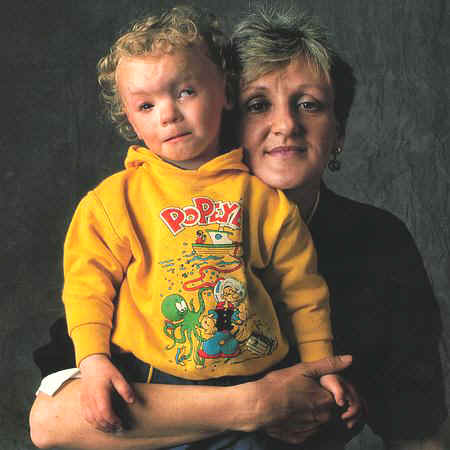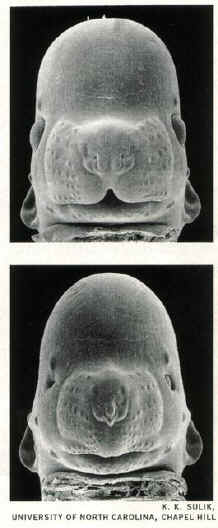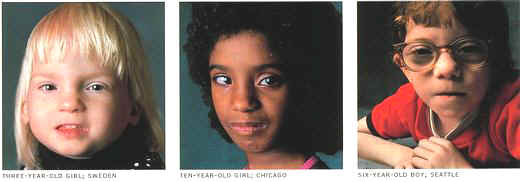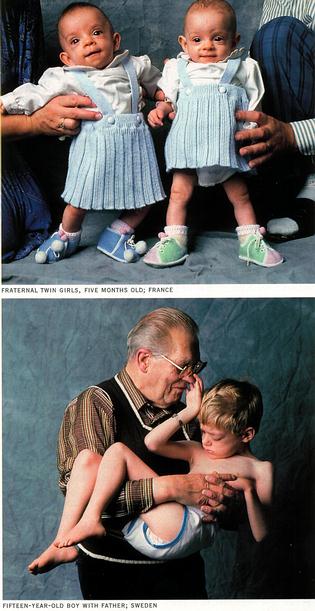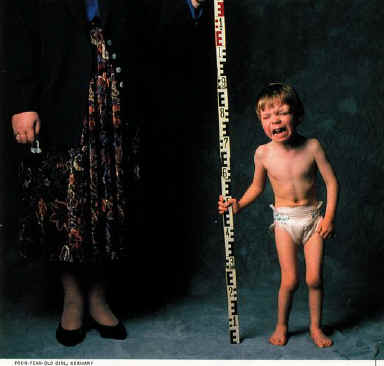|
A S K T H E E X P E R T S VOL 181,
No.2. THE WORLD AS “When Malcolm was born, I thought my heart would break,” she said. “And, oh my God, the guilt…” Ellen O’Donovan (pseudonym) was losing her fight against alcoholism when she discovered she was pregnant. Months later her son was born with fetal alcohol syndrome, and his battles began. I met them both in Dublin, where my photographic coverage had brought me. Ellen and her three-year-old son, Malcolm (left), live in a small town on Ireland’s north coast; they had ridden a bus for six hours to visit Malcom’s doctor, a specialist who is treating the boy for severely defective vision, one of his many alcohol-related disabilities. First identified about 1970, fetal alcohol syndrome (FAS) is a term used to describe the damage some unborn children suffer when their mothers drink during pregnancy. Alcohol in the mother’s bloodstream can be toxic to the developing fetus depending on the stage of pregnancy and how much she drinks. Damage can range from subtle to severe, causing clumsiness, behavioural problems, stunted growth, disfigurement, mental retardation. Ellen’s doctor had told her that an American journalist wanted to photograph her with her son. She consented in hopes that others could learn from her mistake, but when I began unpacking my cameras, she hesitated. Then she took a deep breath and began to talk. “I was drinking a bottle of vodka a day that December,” she said grimly, “so out of touch that I didn’t even know I was two months pregnant. When I found out, I quit there and then, but the damage was done.” The O’Donovans are not alone. Thousands of babies are born with alcohol-related defects each year, ranking FAS as one of the leading known causes of mental retardation. According to his doctors, Malcolm was undersized at birth, with kidneys and a stomach that didn’t work properly; he had to be tube-fed until he was 14 months old. His head is smaller than normal, and he also has facial abnormalities typical of FAS children – small wide-set eyes, a thin upper lip, a short upturned nose, and a receding chin. He was born with damaged corneas, and his eyelids drooped. Surgery later gave him limited sight in his right eye. FAS is irreversible, and during our session it became clear to me that Ellen has dedicated her life to caring for her son. “He doesn’t seem retarded, thank God,” she said. “He’s even starting to talk a little. I’m working with him every day, helping him learn to do the things normal kids do.” I was moved by the way she held him and comforted him in Gaelic when he started to cry. “If this little boy hadn’t come along, I might have drunk myself to death,” she said quietly. She hasn’t taken a drink, she added, in three and half years. Still, it isn’t going to be easy. Unemployed
and living with her mother, Ellen plans each day around Malcolm and
the frequent trips they make to his doctors in Dublin. When I
offered to reimburse her for the bus fare, she declined. “Just
tell women out there that if they want to have a baby, leave the
drink out of it,” she said. Then she kissed her son on the top
of his head and they were gone. Compared with a normal fetus (top), the one exposed to alcohol suffered eye damage, a stunted brain, and facial deformities similar to human babies with FAS, particularly those affected during the first trimester, when bones and organs are forming. Blood-alcohol levels reached during
the experiment approximate those that could occur in a woman of
average size if she drank a quart of vodka within a 24-hour
period. “What’s really sad is how many FAS and FAE kids go through life undetected,” says Ann Streissguth of the University of Washington, a specialist in FAS behaviour. “It takes a trained eye to spot FAS, even in the severely retarded. And in FAE, mildly retarded kids are often misjudged because they tend to be talkative and outgoing. No one dreams their nervous systems are impaired.” As the FAE child grows, such positive traits are often muted by alcohol-related shortcomings – impaired memory, brief attention span, poor judgement and capacity to learn from experience. Some victims drop out of school in frustration or wind up on the margins of society. Fetal alcohol damage shows itself differently in
every child. In the Soviet Union I met a boy, a teenager, who
was continually trying to stab his playmates with scissors; in
Sweden I met a wonderful little girl who was so sweet and beautiful
that I felt I was photographing an angel. Little is known about the thresholds of alcohol that cause FAS. Genetics may also be a factor. Even with fraternal twins one might have severe FAS, while the other is mildly affected. Not all mothers who drink have FAS babies. Some doctors believe that any alcohol puts the baby at risk, while nearly all agree that binge drinking is perilous, especially during the first 12 weeks, when signs of pregnancy are few. As Ellen O’Donovan lamented, “I didn’t even know I was pregnant. That’s the tragedy of it.”
Reduce the measure of your alcoholic drinks to nil when you are pregnant |
